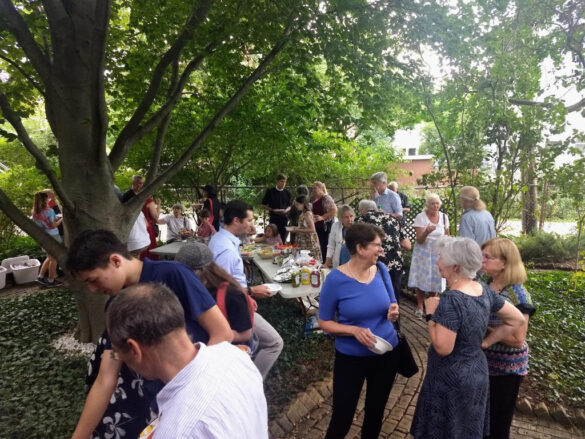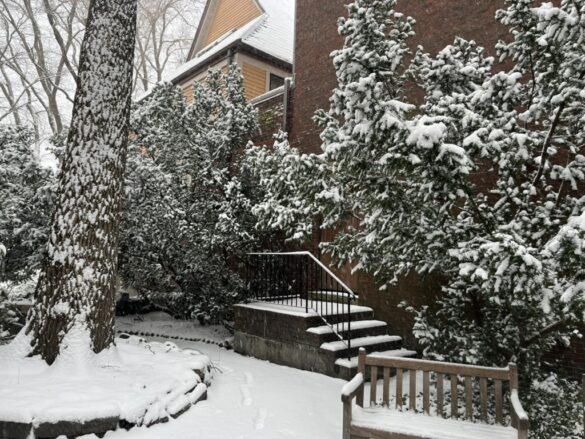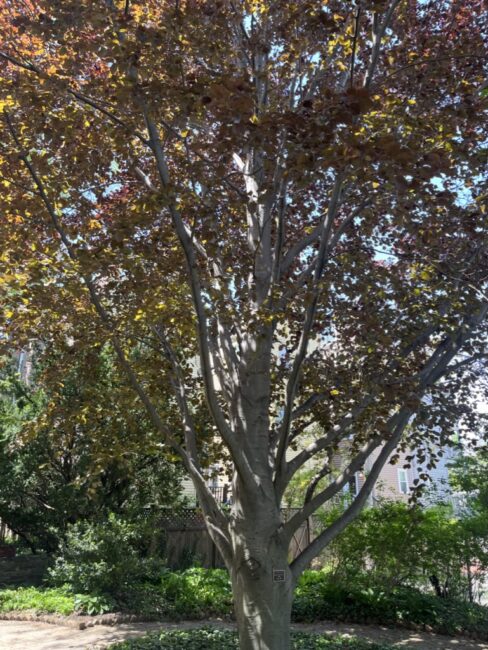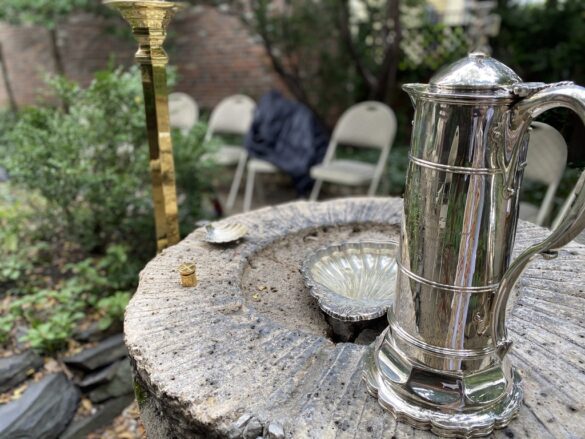Sermon — June 9, 2024
The Rev. Greg Johnston
Have you ever heard the one about the college undergrad who wanders into a debate about the nature of free will?
So, a group of philosophy professors is meeting for their monthly faculty lunch. And they’re arguing about free will. Do we, as human beings, have control over our actions, or are they just the result of physical or biological processes beyond our control?
“Look, people are responsible for their actions,” one professor says over lunch. “Yes, of course they’re shaped by their experiences of the past. But we know that mature human beings make choices all the time between right and wrong. We have free will, and we’re responsible for what we do with it.”
“Oh, come on!” says the second one. “We can’t just work off intuition. Psychology clearly show that our brains make decisions for us before we’ve even consciously realized it, and then we come up with the rationalizations after. Our wills aren’t free at all; our actions are just the result of biology. Empirical science shows that free will is an illusion.”
“Science?” asks the third. “You want to talk about science? Don’t you know anything about how the advent of quantum physics has opened our eyes to a non-deterministic model of causality!?” Things are really heating up.
Just then, a sophomore who’s wandered into the room pipes up. “I’m not so sure about free will. I walked in here, and I saw your lunch buffet, and— I know it was wrong, and I knew I shouldn’t do it, but, well… I just couldn’t stop myself. I ate all the cookies.”
From the Christian theological perspective, at least, there are really two different questions about free will: “Do we have free will?” as in, are the choices we make totally determined by some outside thing, by biology or physics or even by God, or are they under our control? But there’s another question, too— “Do we have free will?” as in, “When we make a decision, whether that’s really an individual choice or determined by some outside force—can we actually follow through?” Are our wills free? Or are they somehow in chains?
The Apostle Paul famously wrote, “I do not understand my own actions. For I do not do what I want, but I do the very thing I hate.” (Romans 7:15) You may know the feeling. Our cookie-eating student certainly does. It’s what Martin Luther called, somewhat ominously, The Bondage of the Will, the fact that the human will is, in some sense, constrained; that there’s some gap between our conscious decision-making processes, and the things we actually do. And I think this is the more relevant question about free will. With all due respect to our philosophical friends, few people are bothered day to day about whether their decisions are predetermined by biology or physics or not; but many people struggle with the inadequacy of their willpower to carry out those decisions.
It’s a pattern that dates back all the way to the beginning of humankind, to this foundational story of Adam and Eve in the Garden. They had free will, and they gave it away. They received the command from God never to eat the fruit of the tree that stood in the middle of the Garden. But they ate it, anyway.
They try to pass the blame along. Both Adam and Eve try to claim that they didn’t have free will, that their actions had some cause outside themselves. “The woman whom you gave me,” says Adam, trying to pin the blame not only on Eve but on God, “she gave me fruit from the tree, and I ate.” (Gen. 3:12) Then God turns to Eve: Don’t look at me! she seems to say. “The serpent tricked me, and I ate!” (Gen. 3:13)
It’s not a very good defense. God entrusted them with the freedom to choose, but told them not to eat the fruit, but they did it anyway, and so God put enmity between the serpent in the Garden and the woman, and between their descendants. And this sounds just about right, because here we are, all these generations later, still struggling against our demons.
You often find Jesus battling demons, too. That’s not just a cute segue from one reading to the next. Much of Jesus’ time, in his early ministry, especially in this early Gospel of Mark, is spent casting out demons of one kind or another. Before he even begins teaching the disciples anything, in the third chapter of the Gospel of Mark, here he is, so renowned for his demon-fighting skills that people have begun to speculate. Is he a demon himself? Or at least, demon-possessed? Is he a sorcerer who calls on one dark power to defeat another?
Not at all, Jesus replies. “How can Satan cast out Satan? If a kingdom is divided against itself, that kingdom cannot stand.” (Mark 3:23-24) To use evil to cast out evil would only weaken itself.
Jesus isn’t evil, or using evil powers. I assume we can all agree on that.
But Jesus continues with an interesting image, that’s a little less obvious: “No one can enter the Strong One’s house,” he says, “and plunder his property, without first tying up the Strong One; then indeed the house can be plundered.” (Mark 3:27) Of all the metaphors we have for who Jesus is and what Jesus does, this has to be one of the strangest: Jesus Christ, Burglar.
Here’s one way to understand what Jesus means: The house is the world in which we live. The Strong One is the spiritual force of evil, violence, and despair that Jews and Christians have sometimes personified as Satan or the serpent. Jesus’ ultimate battle is not with any of the smaller forces of evil, the demons that afflicted people in their lives. Jesus first needs to confront the great power, the Strong One himself, and tie him up; and when that power is bound, then the property in the house can be plundered; when the Strong One is held captive, then we can be freed.
This is, ultimately, the story of Jesus’ life, and of his journey toward the Cross. Jesus is headed toward a struggle against all the powers that hold us down, against the power of Death itself. And we live now, as always, in the in-between time, when Jesus’ victory has begun, but is not yet complete; when the Strong One has been bound, but we’re not yet fully free.
And so we have the ability to love. We have the ability to will and to work for the good. But our wills are not yet completely free to do what’s right, as perfectly as we might want.
So there’s the bad news: the human will isn’t free. We will never reach the place of perfect self-control, in which our conscious decisions and our actions are always perfectly aligned. We’ll never even reach the place in which our decisions or our values are exactly what they should be. We’ll never quite love God with our whole hearts. It’s unlikely that we’ll love our neighbors as ourselves; that bar can be very high, depending on the neighbor. We’ll come here, again and again, with the need to confess our smaller sins, our gossip or apathy, our harsh words or our imperfect compassion—and sometimes even bigger ones.
But that’s good news, too: the human will isn’t free. If you find yourself, coming here, again and again, just as imperfect as the week before— It’s not just you. And I don’t mean that to pass along the blame (“The woman whom you gave me, she gave me the fruit!”) I mean it as an antidote to shame. There’s no shame in being an imperfect person, in having imperfect control over your will. That’s not an individual flaw. That’s the human condition. And everyone else faces that struggle, too.
But there’s even better news than that, and it’s this: We’re not facing that struggle alone. The Holy Spirit is with you, in all the decisions and all the actions of daily life, strengthening you, helping you grow toward a more consistent and a more compassionate kind of love; pray for the Holy Spirit to guide you in those decisions and in those actions, when you need God’s help. Jesus has already gone before you, to bind up the Strong One so that you can be free, even if imperfectly so. And God is beckoning you forward, inviting you into a renewed and restored life, raising you up just as Jesus was raised (2 Cor. 4:14). So “do not lose heart,” as Paul says. “Even though our outer nature is wasting away, our inner nature is being renewed, day by day.” Amen.









